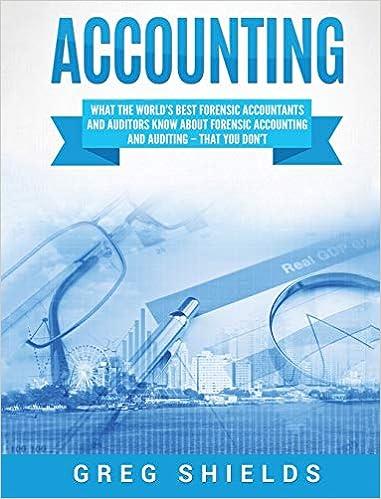Question
The Watson Foundation, a private not-for-profit entity, starts 2020 with cash of $100,000, contributions receivable (net) of $200,000, investments of $300,000, and land, buildings, and
The Watson Foundation, a private not-for-profit entity, starts 2020 with cash of $100,000, contributions receivable (net) of $200,000, investments of $300,000, and land, buildings, and equipment (net) of $200,000. Net assets without donor restrictions were reported as $400,000, the same figure as the net assets with donor restrictions. Of the restricted net assets, $300,000 was purpose restricted whereas the other $100,000 had to be held permanently, although the subsequently earned income is without restriction. Fifty percent of the purpose restricted net assets had to be used to help pay for a new building. The remainder was restricted to the payment of officer salaries. Donors made no stipulations about the eventual reporting of buildings and other long-lived assets when acquired. Watson has one program service (health care) and two supporting services (fundraising and administrative).
During the current year, Watson Foundation has the following transactions.
(1) Computed interest of $20,000 on the unrestricted contribution receivable.
(2) Received cash of $100,000 from the contributions receivable and wrote off another $4,000 as uncollectible.
(3) Received unrestricted cash donations of $180,000.
(4) Received $23,000 in cash that must be spent for a particular type of office machine within the next year or the money must be returned.
(5) Paid salaries of $90,000. Of that amount, $15,000 came from restricted funds. The payment was made to individuals doing health care work.
(6) Spent the $23,000 in (4) for the appropriate office machine.
(7) Received a cash gift of $12,000 that Watson must convey to another specified charity. How- ever, Watson has the right to give this money to a different organization if officials so choose.
(8) Bought a building for $500,000 by signing a long-term note for $450,000 and using restricted funds for the remainder.
(9) Collected annual membership dues of $30,000. Individuals receive substantial benefits from their memberships. By the end of the year, two-thirds of the time for the average membership has passed.
(10) Received unrestricted income of $40,000 generated by net assets that must be held permanently.
(11) The board of directors of the Watson Foundation vote to set aside $9,000 of its investments for emergency purposes.
(12) Paid rent of $12,000 for the past month, advertising of $15,000, and utilities of $16,000. These were half for the program service and one-fourth each for the two supporting services.
(13) Received an unrestricted pledge of $200,000. Watson will collect the money in five years and does not expect any part to be uncollectible. Present value at inception is $149,000, but interest for the year to date is $6,000.
(14) Computed depreciation of $40,000, 60 percent for health care, 30 percent for administrative, and 10 percent for fundraising.
(15) Paid $15,000 in interest on the note signed in (8). All of this cost is assumed to be related to health care.
REQUIREMENT - Only need to prepare the journal entries for each transactions 1 to 15. No need to prepare Financial Statements.
Step by Step Solution
There are 3 Steps involved in it
Step: 1

Get Instant Access to Expert-Tailored Solutions
See step-by-step solutions with expert insights and AI powered tools for academic success
Step: 2

Step: 3

Ace Your Homework with AI
Get the answers you need in no time with our AI-driven, step-by-step assistance
Get Started


